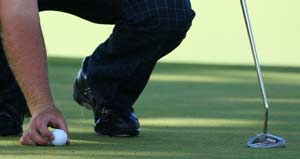The Hacker: It is back to the draining board as I fail to break 100

Your support helps us to tell the story
From reproductive rights to climate change to Big Tech, The Independent is on the ground when the story is developing. Whether it's investigating the financials of Elon Musk's pro-Trump PAC or producing our latest documentary, 'The A Word', which shines a light on the American women fighting for reproductive rights, we know how important it is to parse out the facts from the messaging.
At such a critical moment in US history, we need reporters on the ground. Your donation allows us to keep sending journalists to speak to both sides of the story.
The Independent is trusted by Americans across the entire political spectrum. And unlike many other quality news outlets, we choose not to lock Americans out of our reporting and analysis with paywalls. We believe quality journalism should be available to everyone, paid for by those who can afford it.
Your support makes all the difference.When is a hacker not a hacker? This interesting question is posed by regular reader Richard Taylor, who has had a successful year but is unsure of his present status in the game.
He writes: "I've got my handicap down from 24 to 20 this summer more or less a shot at a time in competitions. Am I still a hacker or is it a state of no relevance to actual handicap?"
Well done, Richard, and as a 27-handicapper I wouldn't presume to call you a hacker. But Tiger Woods might take a different view.
Being a hacker is a state of mind. I know good golfers who modestly refer to themselves as hackers and many bad golfers who bristle if you dare call them one.
It depends who you are comparing yourself with, and the greatest players can occasionally produce shots that would make even a hacker blush.
Being a hacker is nothing to be ashamed of. It is not a description to be cherished but it covers a very large section of golfers without whom the game would be much the poorer.
We pay for far more lessons, buy more of the latest golf equipment, fall for all the gimmicks and gizmos, swell the ranks of golf clubs, drown our sorrows more often in the club bar and do nothing to denude the world's stock of silver and cut-glass.
Hackers fall into two main groups: those who are passing through the beginner's stage on their way to better things; and those who are trapped in the high handicaps because of an ineptitude that refuses to be conquered.
Some say that we remain hackers because we don't try or care enough. The same people scoff "why do you bother?" when we bring in our deplorable scores.
The reason we bother is that we do care and we put up with constant humiliation because of a forlorn but relentless optimism that we will eventually improve.
It doesn't take much to fan these faint embers of hope into a cheery blaze. Last weekend we had a bank holiday competition that involved two medal rounds, one on Saturday and the other on Monday.
My ambition is to break 100 in a medal, a modest enough target but something I haven't managed for 10 years. It has become an obsession so strong it has acquired a self-defeating nature but I felt confident on the first tee on the Saturday.
Such was the immediate collapse of my co-ordination that I was still only 150 yards down the fairway after taking five shots.
This was observed by the steward, who kindly shouted from the clubhouse: "The bar's open if you want to call it a day." I gritted my teeth and proceeded to get an eight.
I then double-bogeyed the second and notched up a 10 on the third. I had dropped 11 shots in three holes.
Strangely, however, my game then improved and I managed to come home with a 105, which was 12 shots better than my previous medal and my best score since September 2003.
I went out on Monday with my confidence considerably buoyed and returned with a score of 114. Back to the draining board, as they say.
Richard questions his status as a hacker. I am totally free of such doubts.
Tip of the week
No 17: chip better the open way
You will always see the Tour professionals stand open to their pitch and chip shots. Why? During a full swing, the body rotates quickly, clearing the hips out of the way of the through swing. With a short shot there isn't enough momentum in the swing to clear the hips.
So, at address, open your feet and hips in the stance to give the arms room to swing freely through those chip shots. This will also encourage the arms to swing with minimum use of the hands, which is the key to consistent pitching. For the more advanced pitchers, you can swing along the line of the open stance with a slightly open club-face, to play a softer landing pitch shot. But remember to open the shoulders as well for this shot.
Simon Iliffe, Head Professional, Purley Downs GC, Surrey
Join our commenting forum
Join thought-provoking conversations, follow other Independent readers and see their replies
Comments